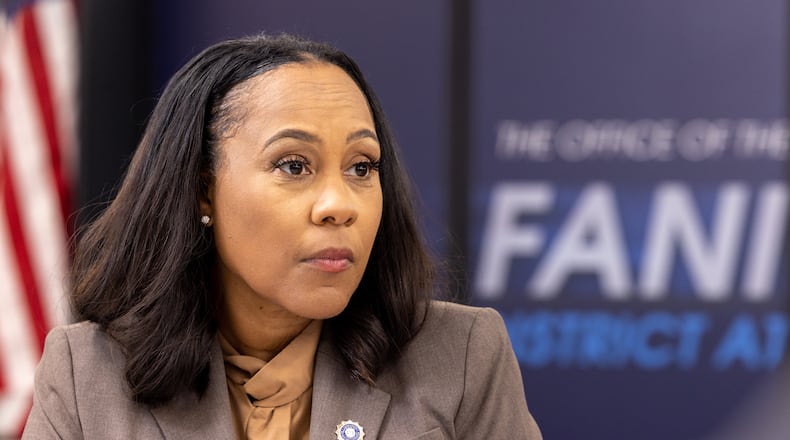The Georgia Court of Appeals ruled on Thursday that Fulton County District Attorney Fani Willis and her office should be disqualified from the 2020 election interference case, a bombshell decision that upends the last remaining criminal case against incoming President Donald Trump.
In a 2-1 opinion, the court concluded that Willis’ onetime romantic relationship with former special prosecutor Nathan Wade merited her dismissal from the case.
“After carefully considering the trial court’s findings in its order, we conclude that it erred by failing to disqualify DA Willis and her office,” Judge Trenton Brown wrote for the majority. He was joined by Judge Todd Markle. A third judge, Benjamin Land, issued a strongly worded dissent.
The appeals court’s ruling overturns a March decision from the case’s trial judge, Scott McAfee. The Fulton Superior Court judge ruled that while he didn’t condone Willis’ “tremendous lapse in judgment,” the defense failed to prove the DA had an actual conflict of interest. He instead said that Willis could stay on the election case if Wade stepped aside, which the Marietta attorney did hours later.
Credit: AP
Credit: AP
Within hours of the decision’s release, the DA’s office announced its intent to appeal to the state Supreme Court. A spokesman declined to comment further.
The appeals court’s decision is a massive blow to Willis, a Democrat and one of the most recognizable prosecutors in the country who cruised to a second term last month against a relatively inexperienced Republican opponent. It also could be the death knell for the fourth and final case that resulted in criminal charges against Trump after he left office in January 2021.
The underlying case technically remains alive. The appeals court declined a separate request from several other defendants to dismiss the indictment entirely. Even if Willis’ office is removed, another prosecutors’ office could be assigned to take over, though many allies of the DA fear the case would effectively die if that were to occur.
Trump celebrated the ruling on Thursday, telling Fox News Digital that “everybody should receive an apology, including those wonderful patriots who have been caught up in this for years.” His lead Atlanta attorney, Steve Sadow, said in a statement that the decision “puts an end to a politically motivated persecution of the next President of the United States.”
Differing opinions
In his majority opinion, Brown wrote that McAfee’s remedy “did nothing to address the appearance of impropriety that existed at times when DA Willis was exercising her broad pretrial discretion about who to prosecute and what charges to bring.”
While the majority said it recognized “an appearance of impropriety generally is not enough to support disqualification, this is the rare case in which disqualification is mandated and no other remedy will suffice to restore public confidence in the integrity of these proceedings.”
Land’s dissent criticized the majority for not deferring to McAfee, who had overseen a hearing of the matter in February, assessed the credibility of witnesses and weighed all the evidence. Land noted that McAfee found the defendants had failed to show that Willis had an actual conflict of interest, financially benefited from her relationship with Wade or that their partnership had any actual impact on the case.
But the majority, “for the first time in the history of our state,” found that the appearance of impropriety is enough to reverse McAfee’s refusal to disqualify Willis and her office, he wrote.
“Where, as here, a prosecutor has no actual conflict of interest and the trial court … rejects the allegations of actual impropriety, we have no authority to reverse the trial court’s denial of a motion to disqualify,” Land wrote. “None.”
Land said if McAfee had, in his discretion, disqualified Willis this would be a different case.
“But that is not the remedy the trial court chose, and I believe our case law prohibits us from rejecting that remedy just because we don’t like it or just because we might have gone further had we been the trial judge,” Land wrote.
All three judges were appointed by Republican governors.
What happens next
Trump’s re-election has already ended the two previous federal criminal cases against him, one involving classified documents and the other his efforts to cling to power after the 2020 election.
It is long-standing policy of U.S. Department of Justice that sitting presidents cannot face federal prosecution.
Credit: Arvin Temkar/AJC
Credit: Arvin Temkar/AJC
Since the Fulton case is state and not federal, Trump could not shutter the prosecution, though constitutional law experts are doubtful that state DAs could prosecute Trump until after he leaves the White House.
Trump was also convicted earlier this year of 34 felonies related to hush money payments he made to a porn star in advance of the 2016 election. In the aftermath of the Nov. 5 election, a judge in Manhattan has pressed pause on sentencing Trump.
Should Willis’ disqualification stand, jurisdiction over the Trump case will shift to a nonpartisan state agency, the Prosecuting Attorneys’ Council of Georgia, known as PAC, which must decide whom to assign it to next.
Pete Skandalakis, the executive director of the PAC, said he was still reviewing Thursday’s opinion but that it could be a while before his organization touches the case, if at all. It could take weeks or months for expected appeals to play out.
“If the case comes to us, then we begin the process of trying to find a conflict prosecutor,” he said.
It is unclear whether there are other prosecutors around the state who would raise their hand to pick up the election case given the resources and time needed to bring such a complex case to trial. Not only that, but the notoriety and threats that Willis has received over the last several years — she travels with around-the-clock security and as recently as October testified at the sentencing of an Alabama man who had threatened her and her family — will likely be further disincentive for many.
Legacy item
The election interference case, which led to felony racketeering charges against Trump and 18 others in August 2023, is not only Willis’ highest profile, but a key part of her legacy. Taking it out of Willis’ hands not only substantially increases the likelihood that it will die before going to trial — but it also constitutes a rebuke of her leadership atop the state’s largest local prosecutorial office.
The disqualification fight has effectively ground the election case to a halt since January and prevented it from going to trial before the presidential election, as prosecutors had initially hoped.
Instead, Willis spent months battling salacious allegations about her personal life. It all culminated at a dramatic hearing in February that featured sworn testimony from Willis and Wade and at times felt like a telenovela.
The disqualification motion was initially brought by Marietta attorney Ashleigh Merchant, who represents defendant Michael Roman, a former Trump campaign official.
While praising the court’s decision on Thursday, Merchant said Willis should have recused herself from the case when the damaging allegations first surfaced in January.
“The failure of judgment is the exact reason Mr. Roman was forced to move to disqualify her in the first place, so we are thankful that the court agreed she should not be allowed to prosecute this case any further,” Merchant said.
Roman is one of Trump’s 14 remaining co-defendants, a list that also includes former New York City Mayor Rudy Giuliani and Mark Meadows, Trump’s onetime chief of staff.
The appellate court’s decision will apply to all of them, according to Don Samuel, who represents another case defendant, lawyer Ray Smith.
In total, nine of the defendants had pushed for Willis’ removal, while six did not.
“If a DA has been disqualified for impropriety, it applies to the entire case,” Samuel said.
High-profile decision
The ruling is undoubtedly the most high-profile for Georgia’s typically under-the-radar appeals court, which is among the busiest of its kind in the country.
The average case there takes roughly eight-and-a-half months from when it is docketed — or officially accepted — to when it is decided, according to legal observers who closely follow the court. So it was notable that the judges decided it in about six months.
The decision comes a few weeks after the court abruptly canceled Dec. 5 oral arguments without any explanation, taking many of the attorneys involved by surprise. Now it’s clear the judges had made up their minds based solely on legal briefs — and well ahead of their mid-March deadline.
Land, Markle and Brown were randomly selected to hear the case via the court’s computer system.
The appeals court is still weighing a separate cross-appeal in the election interference case. The court has until July to decide whether to reinstate, as prosecutors have asked, six criminal charges McAfee dropped from the indictment because they lacked sufficient detail.
Keep Reading
The Latest
Featured






